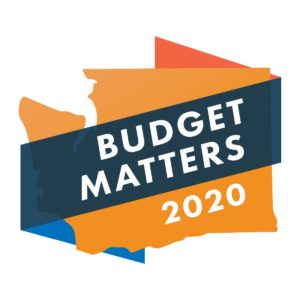In yesterday’s state election, millions of voters across Washington made clear that they want elected leaders to take bold action to advance economic security, racial justice, and public health and well-being.
In the midst of a still-undecided national election – one marked by uncertainty and racist rhetoric and division – it is of course critical that all votes across the country are counted and included in the final results. And in the meantime, Washingtonians will be looking to state leaders to take continued action to address the public health crisis – which we know is disproportionately impacting Black, Indigenous, Latinx, and other people of color, as well as rural communities – and the associated economic crisis that is leaving far too many behind.
We must continue to make our voices heard to ensure state elected leaders follow through on yesterday’s election by developing a state budget that sets Washington on course for an equitable recovery.
Key races in Washington state show support for an equitable budget
Washington voters overwhelmingly re-elected Governor Jay Inslee, a leading voice for investments in public health and community well-being and a proponent of closing the tax break on capital gains and raising taxes on the wealthiest Washingtonians.
Voters also elected a slate of new and returning legislators who committed to prioritizing public investments in schools and health care over budget cuts and to evaluating the racial equity impacts of state budget decisions. Final results in legislative races will take some time, but early results suggest that next year’s state legislature is more representative of our state. Candidates who are leading include Tarra Simmons (23rd legislative district), the first formerly incarcerated legislator, and T’wina Nobles (28th LD), the first Black member of the state Senate in a decade. Early results also suggest that four Black women are on track to be newly elected to the House: Tanisha Harris (17th LD), Jamila Taylor (30th LD), Kirsten Harris-Talley (37th LD), and April Berg (44th LD).
And voters overwhelmingly approved new funding for public transit in Seattle and for critical health care related improvements at Harborview Medical Center in King County.
Now is the time to make your voice heard on the state budget
Elections are just one part of the process of shaping policy change. As state elected leaders now turn their attention to crafting legislation and building a state budget, we must turn our attention to advocating for bold policies that will set our state up for an equitable economic recovery in the 2021 legislative session.
The single most important piece of policy that the legislature will act on in the upcoming session is the state budget. Due to the pandemic, lawmakers expect state revenue collections to fall nearly $4 billion short of the amount needed to sustain our existing commitments to schools, health care, child care, and other essential investments for the next three years. Communities across the state are rightfully calling on lawmakers to not only address the current crisis, but to also make permanent structural changes to address underlying inequities based on race, geography, and economic status. They are also calling for new investments necessary for a robust and equitable recovery.
Washington residents must call on Governor Inslee to act boldly and decisively in preparing a state budget that advances an equitable recovery by:
- Providing cash assistance directly to people most impacted by the COVID-19 crisis, including enacting a broad-based Recovery Rebate, improving access to existing cash assistance programs like Temporary Assistance for Needy Families (TANF)/WorkFirst, and expanding assistance to those excluded from traditional unemployment insurance.
- Raising progressive revenue to equitably invest in communities, including: taxing the profits from the sales of stocks and bonds through a state capital gains tax on the ultra-wealthy; enacting new taxes on the excessive wages and salaries paid to CEOs and other highly paid employees at large corporations; and extending the state estate tax to residents who inherit huge sums of wealth from relatives outside of the state.
- Bolstering investments in public services that support well-being by rejecting knee-jerk cuts and instead making critical investments in core public services like public health, schools and affordable healthcare, and in the essential workers who provide these services.
Governor Inslee is already working on his budget proposal and will likely release it in mid-December. There is still time to advocate for budget priorities directly with Governor Inslee and his staff, and there will be additional opportunities as we move into the state legislative session and legislators begin to develop their budgets. (Check out the budget and revenue development timeline and learn about opportunities to make your voice heard.)
Learn more about the process, timeline, and advocacy opportunities for the 2021-23 state budget and revenue proposals.
Washington voters were clear in yesterday’s election that they are counting on state leaders to look out for their well-being regardless of the outcome of the national election. This means building a state budget that prioritizes balancing our state tax code in order to fund investments in those communities most impacted by COVID-19 and ensure a better future for all of us.

To continue this conversation, register today for our Budget Matters virtual policy summit coming up on Tuesday, November 17.